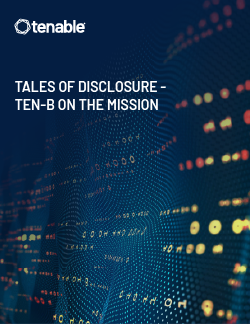White paper
Tales Of Zero-Day Disclosure
Tenable Researchers Reveal Recommendations for a Successful Experience
The concept of discovering and disclosing vulnerabilities is a major part of the regular cycle of how cybersecurity operates. The process of discovery and disclosure of vulnerabilities has been a standard process of bringing researchers and vendors together to acknowledge what has been found, and to ensure the flaws are fixed and users will be better protected.
 Sounds simple? For the most part it is that easy, but there are still too many instances where the circle is not complete, and the vendor and researcher cannot find the connection point.
Sounds simple? For the most part it is that easy, but there are still too many instances where the circle is not complete, and the vendor and researcher cannot find the connection point.
A new whitepaper from Tenable’s Zero Day Research team details challenging experiences from various cases of vulnerability disclosures. Taken from the team’s experiences during the past few years, the stories include examples of vendor resistance such as:
- claims from other vendors that the vulnerability is unsubstantiated or not in scope;
- a notified vendor being openly hostile towards the researchers; and
- a notified vendor becoming increasingly hostile throughout the disclosure process.
Nobody wants to be the recipient of a zero-day vulnerability notice, as this can put developers and security teams on the defensive, and that does not aid anyone in resolving the issue.
For Tenable’s Zero Day Research team, each and every security-related bug disclosure is its own unique adventure. In this white paper, we look at examples of where vulnerability disclosure was not welcomed by the recipient, where there were clashes and why they happened, and what organizations can do to work better with researchers.
Learn More
- Follow the Tenable Zero-Day Research team via the technical blog.
- Tenable Identity Exposure